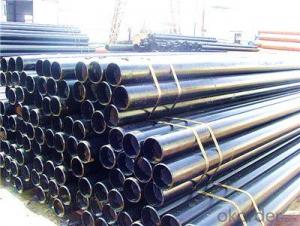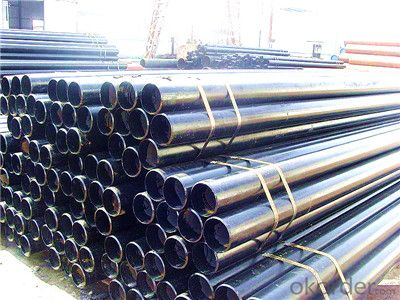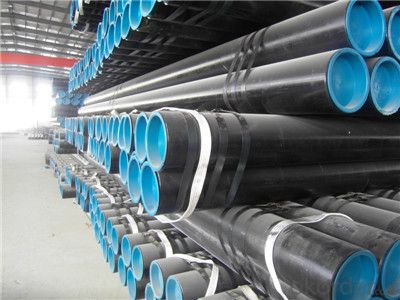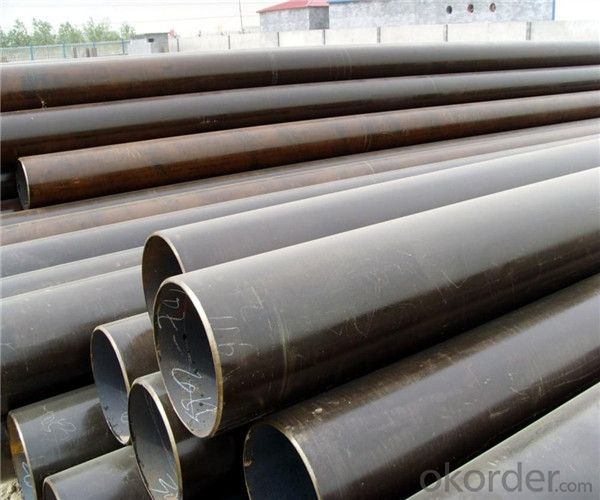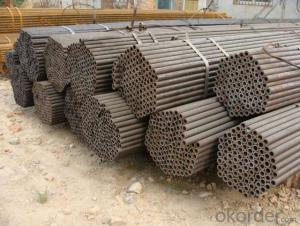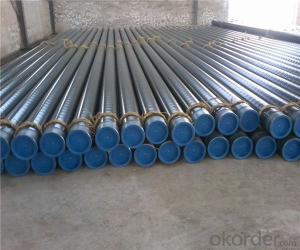Seamless Steel Pipe with High Quality/Best Price
- Loading Port:
- Tianjin
- Payment Terms:
- TT OR LC
- Min Order Qty:
- 50 m.t.
- Supply Capability:
- 3000000 m.t./month
OKorder Service Pledge
OKorder Financial Service
You Might Also Like
PRODUCT DETAILS
1.Structure of Seamless Steel Pipe Description:
A large amount of Seamless Steel Pipes is offered to the clients at cost effective rates. These pipes are extremely durable, resistant to corrosion and have high tensile strength. Our pipes are used in nuclear plants, power plants, refineries and construction industry across the country. Furthermore, we are capable of providing these seamless pipes to the clients in bulk quantity.
2.Main Features of the Steel Pipe:
• High manufacturing accuracy
• High strength
• Small inertia resistance
• Strong heat dissipation ability
• Good visual effect
•Reasonable price
3.Seamless Steel Pipe Specification:
| Standard: | GB, DIN, ASTM,ASME, ASTM A106-2006, ASTM A53-2007 |
| Grade: | 10#,20#, 45#, 16Mn |
Thickness: | 8 - 33 mm |
| Section Shape: | Round |
| Outer Diameter: | 133 - 219 mm |
| Place of Origin: | Shandong, China (Mainland) |
| Secondary Or Not: | Non-secondary |
| Application: | Hydraulic Pipe |
| Technique: | Cold Drawn |
| Certification: | API |
| Surface Treatment: | factory state or painted black |
| Special Pipe: | API Pipe |
| Alloy Or Not: | Non-alloy |
| Length: | 5-12M |
| Outer Diameter: | 21.3-610mm |
| Packaging Details: | Seaworthy packages, bundles wrapped with strong steel strip |
4.FAQ of Seamless steel pipe:
①How is the quality of your products?
Our products are manufactured strictly according to national and internaional standard, and we take a test
on every pipe before delivered out. If you want see our quality certifications and all kinds of testing report, please just ask us for it.
Guaranteed: If products’ quality don’t accord to discription as we give or the promise before you place order, we promise 100% refund.
②How about price?
Yes, we are factory and be able to give you lowest price below market one, and we have a policy that “ for saving time and absolutely honest business attitude, we quote as lowest as possible for any customer, and discount can be given according to quantity”,if you like bargain and factory price is not low enough as you think, just don’t waste your time.Please trust the quotation we would give you, it is professional one.
③Why should you chose us?
Chose happens because of quality, then price, We can give you both.Additionally, we can also offer professional products inquiry, products knowledge train(for agents), smooth goods delivery, exellent customer solution proposals.Our service formula: good quality+good price+good service=customer’s trust.
SGS test is available, customer inspection before shipping is welcome, third party inspection is no problem.
Any question, pls feel free to contact us !
- Q: Can steel pipes be used for the construction of offshore platforms?
- Yes, steel pipes can be used for the construction of offshore platforms. Steel pipes are commonly used in offshore construction due to their high strength, durability, and resistance to corrosion in harsh marine environments. They are suitable for various applications, including the fabrication of jacket legs, risers, pile sleeves, and other structural components necessary for offshore platform construction.
- Q: How are steel pipes used in the manufacturing sector?
- Steel pipes are commonly used in the manufacturing sector for various purposes, such as transporting fluids and gases, providing structural support, and facilitating the flow of materials in manufacturing processes. They are used in industries like construction, oil and gas, automotive, and aerospace for applications such as pipelines, machinery, conveyors, and infrastructure. Steel pipes offer durability, strength, and resistance to corrosion, making them an ideal choice for many manufacturing needs.
- Q: Can steel pipes be used for fire sprinkler systems?
- Yes, steel pipes can be used for fire sprinkler systems.
- Q: Can steel pipes be used for structural supports in buildings?
- Yes, steel pipes can be used for structural supports in buildings. Steel pipes are commonly used in construction due to their high strength, durability, and ability to withstand heavy loads. They provide excellent structural support, especially in applications that require long spans or high load-bearing capacities. Additionally, steel pipes are resistant to corrosion and can be easily connected or welded, making them a popular choice in building construction.
- Q: What are the advantages of using steel pipes in the mining industry?
- One of the key advantages of using steel pipes in the mining industry is their exceptional strength and durability. Steel pipes can withstand high-pressure environments, heavy loads, and harsh conditions commonly found in mining operations. Additionally, steel pipes are resistant to corrosion, which is vital in mining where water and other chemicals are often present. Moreover, steel pipes offer excellent thermal conductivity, allowing for efficient transportation of fluids, such as water or slurry, crucial for mining processes. Lastly, steel pipes are relatively easy to install and maintain, making them a preferred choice for mining projects.
- Q: How do steel pipes handle water hammer in high-rise buildings?
- Steel pipes in high-rise buildings are designed to handle water hammer through various measures. Firstly, steel pipes have high strength and durability, allowing them to withstand the sudden pressure surges caused by water hammer. Additionally, steel pipes are often installed with shock absorbers or surge tanks to reduce the impact of water hammer. These devices absorb and dissipate the excess energy generated during water hammer, preventing damage to the pipes and fittings. Moreover, proper pipe sizing, layout, and support systems are implemented to minimize the effects of water hammer, ensuring the smooth and efficient flow of water in high-rise buildings.
- Q: How are steel pipes used in the water treatment industry?
- Steel pipes are used in the water treatment industry for various applications such as transporting water from the source to the treatment plant, distributing treated water to consumers, and conducting tests and inspections of the water quality.
- Q: How are steel pipes used in agriculture?
- Steel pipes are commonly used in agriculture for a variety of purposes, such as irrigation systems, water supply lines, and drainage systems. These pipes are durable, resistant to rust and corrosion, and can withstand high pressure, making them ideal for transporting water and other fluids across farmland. Additionally, steel pipes are used to construct structures like greenhouses, fencing, and livestock enclosures, providing strength and stability to support agricultural operations.
- Q: What are the standard dimensions and weight of steel pipes?
- The specific type and grade of steel pipes determine the variation in standard dimensions and weight. Nonetheless, the industry widely accepts some common standard dimensions and weight ranges. Seamless steel pipes typically have standard dimensions ranging from 1/8 inch to 60 inches in outer diameter (OD) and from 10.3 mm to 914.4 mm in wall thickness. The weight of seamless steel pipes varies depending on the size and length, ranging from a few kilograms to several metric tons. Similarly, welded steel pipes have standard dimensions ranging from 1/2 inch to 80 inches in OD and from 3.2 mm to 25.4 mm in wall thickness. The weight of welded steel pipes can also greatly vary, ranging from a few kilograms to several metric tons. It is worth noting that the dimensions and weight of steel pipes can be customized according to specific project requirements. Moreover, different countries or regions may have their own standards and specifications for steel pipes. Therefore, it is always advisable to consult the relevant standards and guidelines when determining the dimensions and weight of steel pipes for a particular application.
- Q: How do you calculate the pipe friction loss coefficient for steel pipes?
- To determine the pipe friction loss coefficient for steel pipes, it is necessary to take into account several factors. One commonly used approach is the utilization of the Darcy-Weisbach equation, which establishes a relationship between the frictional head loss in a pipe and the flow rate, pipe diameter, pipe length, fluid properties, and the pipe roughness coefficient. The Darcy-Weisbach equation can be presented as follows: The head loss due to friction, denoted as hf, can be calculated using the formula (f * L * V^2) / (2 * g * D), where: - f represents the pipe friction factor, - L corresponds to the pipe length, - V denotes the fluid velocity, - g symbolizes the acceleration due to gravity, and - D represents the pipe diameter. Determining the pipe friction factor, f, is crucial. For steel pipes, this factor relies on the pipe roughness coefficient, which indicates the relative roughness of the pipe. The relative roughness is determined by dividing the absolute roughness of the pipe surface by the pipe diameter. The pipe roughness coefficient can be obtained from different sources, including manufacturer specifications, engineering handbooks, or experimental data. It is imperative to ensure that the roughness coefficient used aligns with the specific type and condition of the steel pipe under analysis. Once the pipe roughness coefficient is obtained, it can be employed to calculate the pipe friction factor through empirical correlations or charts. These correlations often involve the Reynolds number, a dimensionless quantity that characterizes the flow regime. By substituting the determined pipe friction factor into the Darcy-Weisbach equation, it becomes possible to calculate the head loss due to friction for steel pipes. This value is indispensable in the design of piping systems, determination of pump requirements, or estimation of energy consumption in fluid flow applications.
Send your message to us
Seamless Steel Pipe with High Quality/Best Price
- Loading Port:
- Tianjin
- Payment Terms:
- TT OR LC
- Min Order Qty:
- 50 m.t.
- Supply Capability:
- 3000000 m.t./month
OKorder Service Pledge
OKorder Financial Service
Similar products
Hot products
Hot Searches
Related keywords
